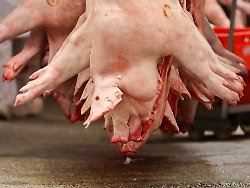Monday, December 13, 2021
Emissions under the microscope
Meat industry is as dirty as oil companies
Destructive verdict for the European meat and dairy industry: experts examine the carbon footprint of the 35 largest beef, pork, poultry and dairy companies. Among other things, Tönnies produces more and more greenhouse gases.
According to a study by the Institute for Agriculture and Trade Policy (IATP), the greenhouse gas emissions caused by Europe’s largest companies in the meat and dairy industry are continuing to increase. “The climate footprint of the major European meat and dairy companies is comparable to that of the major players in the fossil fuel sector“, explained IATP boss Shefali Sharma. But at the same time they have not been in the focus of politics so far and so get away” with impunity “.
The IATP experts examined the carbon footprint of the 35 largest beef, pork, poultry and dairy companies headquartered in the EU, Great Britain and Switzerland. Including emissions in their supply chains, especially in livestock, these companies were responsible for seven percent of EU emissions in 2018; the output of the 20 largest companies exceeds that of the Netherlands.
Greenhouse gas emissions from Tönnies significantly increased
From Germany, the Tönnies slaughterhouse is one of the meat industry companies examined. Here the report comes to the conclusion that the emissions of climate-damaging greenhouse gases caused by Tönnies increased by 30 percent between 2016 and 2018. The picture is similar for the Irish slaughterhouse company ABP or the French companies specializing in dairy products, Danone and Lactalis.
The IATP criticizes the fact that only a few of the companies examined have submitted plans to improve their climate footprint. According to this, German emissions are among the highest in the EU, but none of the companies disclose the data or name a climate target. And those who had such strategies “rely on accounting tricks, greenwashing, and the dubious effects of offsetting to distract from the fundamental changes needed to reduce emissions”. Instead, the experts complain that costs and risks are “passed on to the farmers”.
